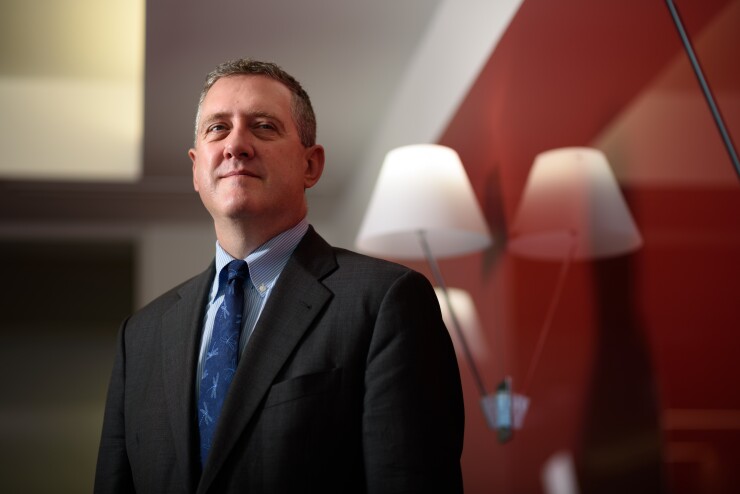
Federal Reserve Bank of St. Louis President James Bullard has stepped down to take an academic job, the bank announced Thursday.
Bullard has overseen
He will formally leave the bank on Aug. 14 to become the dean of Purdue University's Mitchell E. Daniels Jr. School of Business, but he has vacated the positions of president and chief executive. During the next month, he will serve as an advisor to "ensure a smooth transition," the bank stated in a press release.
Kathleen O'Neill Paese, the bank's first vice president and chief operating officer, will serve as interim president and CEO until a permanent replacement is found.
Bullard's departure marks the third resignation of a reserve bank president this year, with then-Chicago Fed President Charles Evans and then-Kansas City Fed President Esther George retiring in January. Evans was replaced by former Obama economic advisor
The St. Louis Fed's board of directors has assembled a six-member search committee to find Bullard's replacement. The group is made up of directors who are not affiliated with banks regulated by the reserve bank. It includes James McKelvey, founder and CEO of St. Louis-based Invisibly Inc.; Carolyn Chism Hardy, president and CEO of Bartlett, Tennessee-based Chism Hardy Investments LLC; Lal Karsanbhai, president and CEO of Emerson Electric Co. in St. Louis; R. Andrew Clyde, president and CEO of Murphy USA in El Dorado, Arkansas; Penny Pennington, managing partner of Edward Jones in St. Louis; and Michael Ugwueke, president and CEO of Methodist Le Bonheur Healthcare in Memphis.
The bank will also hire a national executive search firm to assist in the hiring process.
"We have our work cut out for us," McKelvey, who chairs the St. Louis Fed's board of directors, said in a statement. "Bullard combines economic scholarship with management savvy. His ability to clearly communicate economic policy is a rare gift. Replacing such a special talent will require a special process, so we will be conducting an open, public search for our next great leader."
Bullard began his career at the St. Louis Fed in 1990 as an economist in the bank's research division. He has also served as vice president and deputy director of research for monetary analysis.
Bullard took the top post at the reserve bank in 2008, in the middle of the subprime mortgage crisis. In the years that followed, he expressed skepticism about some of the bank regulatory reforms enacted in Washington,
Along with overseeing banks in his district, Bullard also served as a voting member on the Fed's monetary policymaking board, the Federal Open Market Committee, on a rotating basis. His latest stint was last year, when Bullard was a one of the more vocal members of the committee, at times calling for a more aggressive approach to tightening monetary policy. The St Louis Fed will not have a vote on the committee again until 2025.
Bullard drew criticism last fall for speaking at a private, invitation-only event hosted by Citigroup in Washington in an episode that raised questions about the president giving the bank special access. Typically, reserve bank members limit their speaking engagements to public events. A transcript of his remarks at the Citi event lined up closely with a public speech Bullard made that same week, but the reserve bank said it would "think differently" about nonpublic appearances by the president moving forward.
Like other Fed governors and reserve bank presidents, Bullard has continued to participate in the FOMC's summary of economic projections, a quarterly survey of officials' expectations on various economic factors, including inflation, unemployment and interest rates. He has remained a proponent of continued interest rate hikes in the face of mixed economic signals. He has also been an active public speaker, giving talks on macroeconomic issues in Ireland and Norway last month alone.
In a statement, Bullard called his time at the St. Louis Fed "both a privilege and an honor." He also said he has confidence in the organization's ability to continue "promoting a healthy economy and financial stability."
"The Bank is well-positioned for ongoing success and impact," he said. "I am also grateful to have worked alongside such dedicated and inspiring colleagues across the Federal Reserve System and for the opportunity to have worked for the many outstanding directors who have served on the St. Louis Fed board. It's been an honor to serve this great institution."






